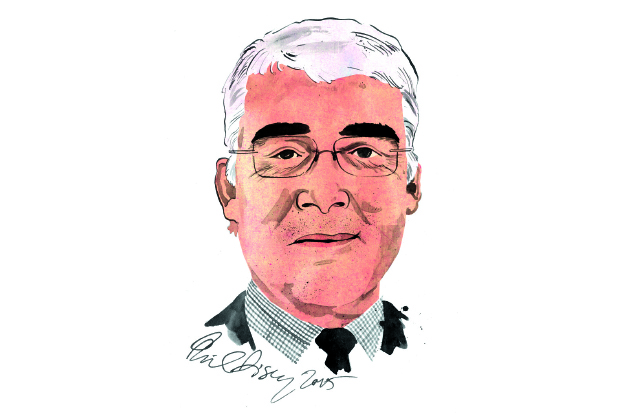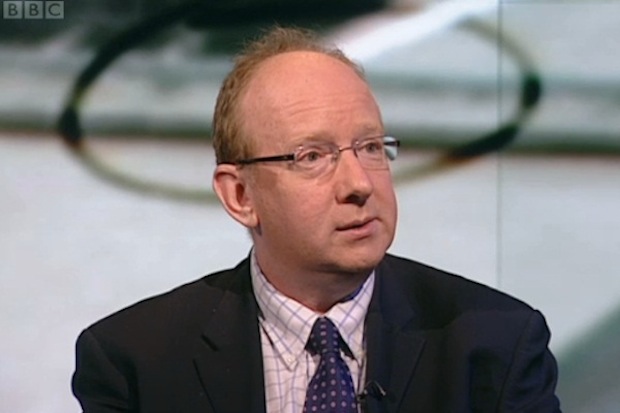It was mid-October and Downing Street was in a panic. Lord Freud, the welfare minister, had been secretly recorded suggesting that disabled people could be paid less than the minimum wage.
Labour demanded Freud should go. The No. 10 press office was briefing journalists that he would be out within hours. Craig Oliver, excitable Downing Street director of communications, advised the Prime Minister that Freud was finished.
There was talk of the return of the nasty party, and days of dreadful headlines. In the end David Cameron stayed loyal. Within 48 hours the story was forgotten.
Welfare reform is the coalition’s most important achievement. Universal Credit is at the heart of welfare reform. David Freud drove through universal credit when many others wanted him to give up, and the technical problems looked insoluble. His title is junior — parliamentary under secretary of state for work and pensions. In truth he has done work which outranks almost all cabinet ministers in importance. David Freud has left an imprint on Britain that will be felt half a century from now.
Britain’s shallow media/political culture, dominated by the trivial and the short term, is incapable of appreciating let alone understanding this. David Freud’s quiet determination, long-term vision, gentle humour and exquisite mastery of detail have remained a national secret.
He is a master of his brief. He is one of a handful of Conservative ministers outside the cabinet who have stayed in the same job for the last five years. Lord Freud is not a party politician. He has worked with Labour as well as the Conservatives, yet Iain Duncan Smith’s welfare reforms would have been impossible without him.
Great-grandson of Sigmund Freud, David joined the Financial Times after Oxford university, ending up writing the Lex column. He joined SG Warburg, then Britain’s most celebrated merchant bank, where he steered Eurotunnel and Euro Disney towards flotation.
Nine years ago Tony Blair, in an inspired move, invited David Freud to review the welfare system. He recommended much more private sector involvement in helping the long-term jobless back into the workplace.
His recommendations made sense to everyone apart from Gordon Brown, who made sure Freud and his reforms went nowhere. In despair David Freud crossed the street to the Conservatives, who made him a life peer and appointed him shadow welfare minister.
From then on Freud dedicated himself to unravelling Gordon Brown’s disastrous welfare system. Some of the solutions — for instance employing private firms to bring the unemployed back into the workplace, or setting more rigorous tests for disability benefit — were relatively easy to implement.
Far more complex was replacing Gordon Brown’s calamitous system. This had grown so complicated that even managers of benefits offices found it hard to operate, let alone clients. There were too many different credits. It was arbitrary and unpredictable. Worst of all, these Kafkaesque rules often meant that it was financial lunacy for people on benefits to take on more work. This encouraged a pool of long-term unemployed, condemned to live as clients of the state — economic madness and a human tragedy.
Freud recognised that the solution was a single universal benefit, which everyone could understand. Huge technical problems presented themselves because it meant scrapping Brown’s tax credits and starting again with a new system — and a new computer — large enough to cope with 20 million people.
Such a system needed to talk, in real time, both to HMRC and to employers. When Freud asked the advice of accountants PwC, he was told that it would take eight years to build.
For this reason there was no commitment to impose universal credit in the Tory manifesto. Then, with just months to go before the 2010 general election, Lord Freud had what he calls his ‘lightbulb moment’. Over coffee with a chance acquaintance he learnt that the payments systems company VocaLink had already designed a real-time PAYE system, and that it worked.
It was now clear that Universal Credit was possible. It was a question of making it happen. Lord Freud says that he lost a stone over the summer of 2010 as he set out the details in the welfare white paper.
There have been huge teething problems. The project nearly foundered over how to prevent fraud. Philip Langsdale, the civil servant who had been brought in to mastermind the new technology, suddenly died. George Osborne at the Treasury formed an improbable alliance with Polly Toynbee at the Guardian as they both warned that the idea would never work.
Last month Universal Credit started to roll out nationally and there are now unmistakable signs that the project can be a success. More than 30 million are in work, the highest level on record, while the employment rate stands at over 73 per cent.
Private sector employment has soared, amidst intriguing signs that coalition welfare reforms are changing the structure of the jobs market. Here is Ben Broadbent, deputy governor of the Bank of England: ‘In certain areas of the labour market, particularly the lower-skilled end, there are things that are increasing the supply of labour.
‘I’m thinking of changes to welfare rules in particular that mean that people might be less inclined at the margin to want to stay in unemployment, or even to stay outside the labour force. It may encourage them to come back in.’
If Broadbent is right, then this government’s welfare reforms, by easing the labour market, have brought down the natural level of unemployment. This does not simply mean greater economic prosperity. It means hope and personal fulfilment for those who would otherwise have been on the margins of society. This is something to be proud of and many people — from anonymous civil servants to welfare secretary Iain Duncan Smith — deserve huge credit.
So does David Freud, one of those people who gives public service a good name. Arguably, refusing to sack him was the best decision made by David Cameron in the last five years.
Got something to add? Join the discussion and comment below.
Get 10 issues for just $10
Subscribe to The Spectator Australia today for the next 10 magazine issues, plus full online access, for just $10.
Peter Oborne is an associate editor of The Spectator.
You might disagree with half of it, but you’ll enjoy reading all of it. Try your first month for free, then just $2 a week for the remainder of your first year.














Comments
Don't miss out
Join the conversation with other Spectator Australia readers. Subscribe to leave a comment.
SUBSCRIBEAlready a subscriber? Log in